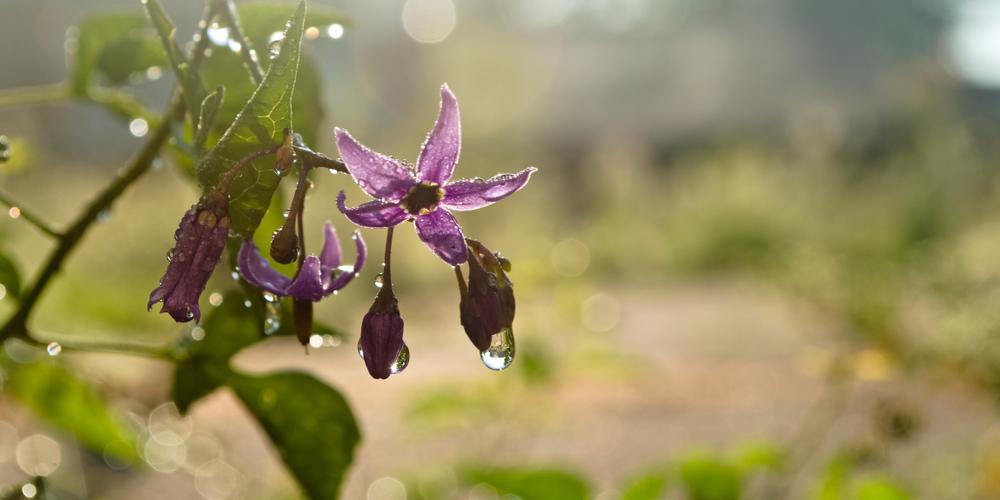- Belladonna is one of the most poisonous plants on earth, and has been used since ancient times both for medicinal and aesthetic purposes, as well as for settling old scores.
- Rich in medicinal properties, this versatile plant has been used throughout history, from Ancient Egypt to the Middle Ages, for treating a number of conditions.
- That said, it is important to be extra careful when administering it, as an overdose can lead to serious adverse effects and even to death.

What is belladonna?
Belladonna (Atropa belladonna) is a perennial shrub native to Europe, Northern Africa and Eastern Asia. Belonging to the family Solanaceae, it grows up to 1.5 metres in height and thrives best in shade. The flowers are bell-shaped and purple in colour, while the berries, bitter-tasting spheres the size of cherries, are shiny black, contrasting with the long, oval, deep green leaves. These, together with the roots, are used in medicinal products. Also known as deadly nightshade, it flowers from spring to summer.
Why is the effect so strong?
Belladonna produces a series of highly toxic alkaloids – mainly atropine but also scopolamine – which have various medical applications when administered in low doses. Belladonna poisoning typically causes dry mouth, blurred vision, hallucinations and even circulatory collapse followed by respiratory arrest.
Responsible for these adverse effects are the above-mentioned alkaloids, which at too high a dose can have a fatal effect on the body:
- Atropine: Causes dry mouth and inhibits the activity of sweat glands, producing tachycardia, confusion, delirium and hallucinations when taken at high doses.
- Scopolamine: Acts as a central nervous system depressant, causes pupil dilation and tightening of blood vessels and inhibits the secretion of saliva and digestive juices. At too high a dose it can cause delirium, a coma, cardiac arrhythmias, respiratory failure, vascular collapse and even death.
What are its medical applications?
Belladonna has been used as a narcotic, among other therapeutic uses, since ancient times. Highly toxic, it should always be administered under medical supervision. Known for its painkilling, sedative, anti-asthmatic and spasmolytic properties, here are some medicinal uses of this mysterious plant:
- Anticonvulsant, antiulcer and anti-asthmatic effect
- Relief from menopausal disorders
- Painkilling effect, particularly for menstrual cramps
- Treatment for gout and hyperuricemia
- Treatment for heartburn
- Narcotic effect
- Muscle relaxer
Important note: Belladonna is not recommended during pregnancy and breastfeeding
Belladonna, the witches herb: Myths and legends
Having been used for tragic, even mystic, purposes throughout history because of its high toxicity and its rare properties, the plant is surrounded in a shroud of tragic romanticism.
Cleopatra, for instance, is said to have considered using belladonna when planning her suicide, a possibility she apparently discarded after giving the substance to a slave and seeing him die in agony. The name Belladonna ("beautiful woman") comes from Ancient Rome, when women used to apply the juice of the berries to their eyes in order to cause their pupils to dilate and make their eyes resemble those of gazelles, a sign of beauty at the time. The old saying about having to suffer for beauty was never so true, as many women ended up dying from an overdose.
Belladonna is also responsible for the myth that witches fly on brooms. The plant was one of the main ingredients in their potions and ointments, and as back then there was no accurate way to calculate doses, the sorceresses resorted to topical application. Apparently, they covered their broomsticks in a balm made from the plant and applied it vaginally by placing the stick between their legs. This caused them to hallucinate and made them believe they were flying.
Demonised and revered in equal parts throughout history, Belladonna is yet another example that the difference between poison and medicine lies in the dose.




Comments from our readers
There are no comments yet. Would you like to be the first?
Leave a comment!Did you like this post?
Your opinion about our seeds is very important to us and can help other users a lot (your email address won't be made public).